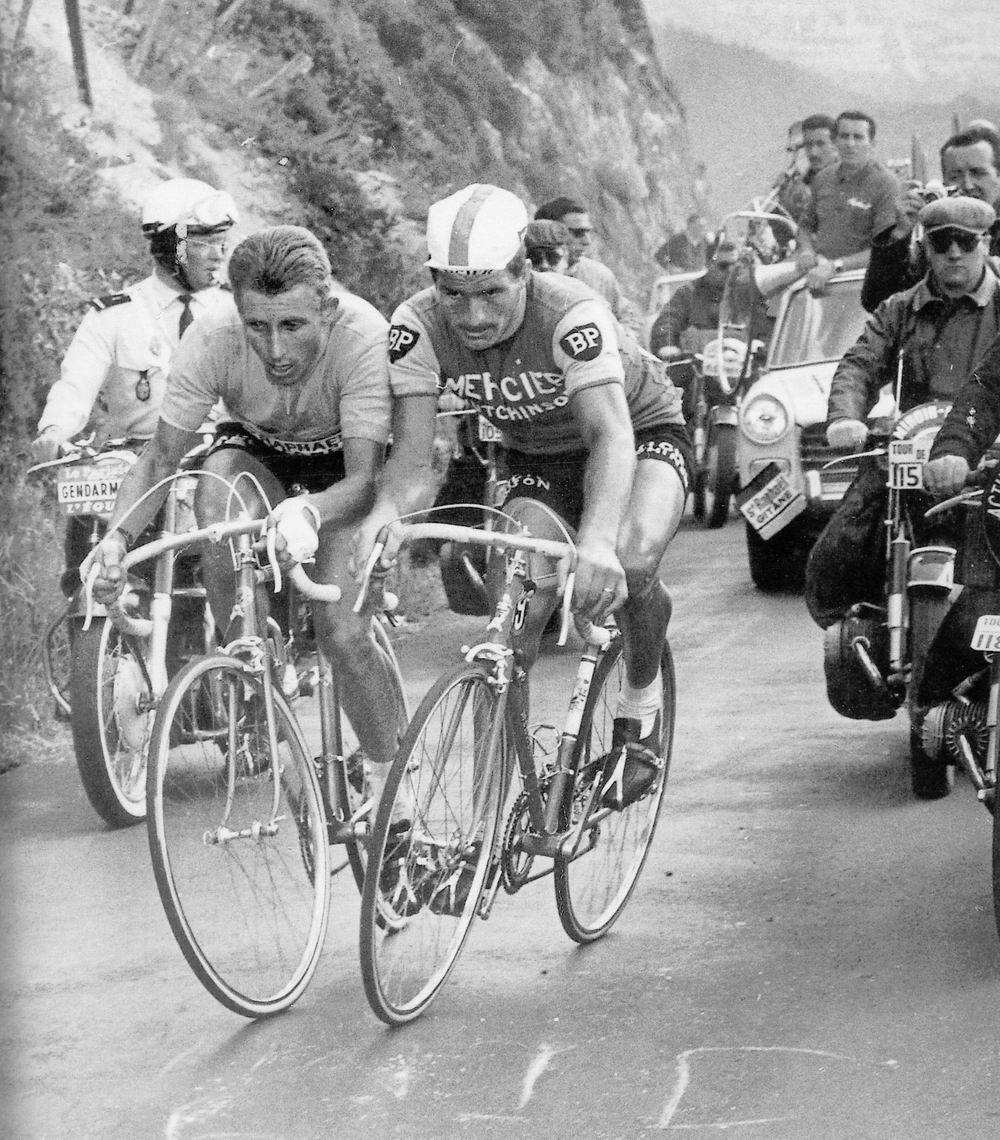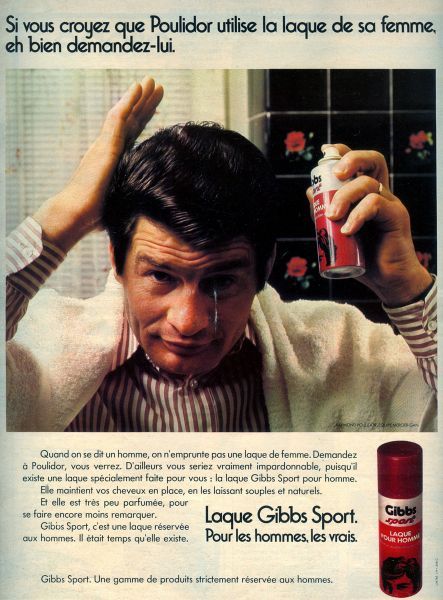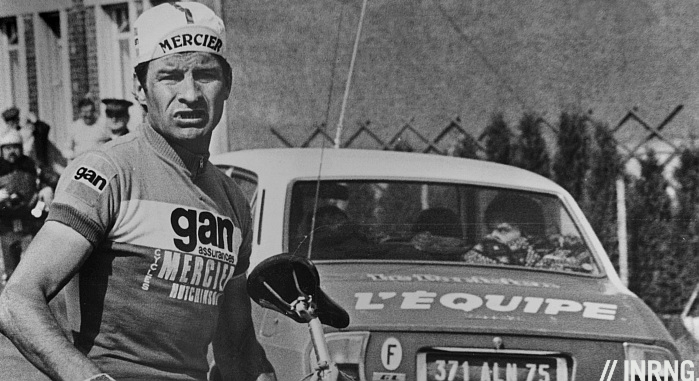Raymond Poulidor is 77 today. The Frenchman has two nicknames “Pou-Pou” and “The Eternal Second” and unfortunately for him his Wikipedia entry begins ” ‘Pou-Pou’ redirects here. For other uses, see Poo-poo (disambiguation)”. But two names are linked as Poupou was a term of affection for an underdog, a rider who finished second so often that he won fame and fortune for losing.
But the more I read about him, the more he seems to be a misunderstood rider whose myths and simple labels mask the truth of an efficient and calculating rider.
Eternal Palmarès
Often portrayed as a loser his list of wins is impressive with the Vuelta, Milan-Sanremo, double wins in Paris-Nice and the Dauphiné, the now defunct Grand Prix du Midi Libre, 11 stage wins in the Tour and more. He stood on the Tour de France podium in Paris eight times. But the distribution of his results is remarkable, a series of podium places without a win. Here’s 1963:
Wins: Flèche Wallonne, GP des Nations, GP de Lugano, stage in Critérium National, stage in Paris-Luxembourg.
Placings: 2nd Tour du Sud-Est, 2nd Critérium national, 2nd Grand Prix de Cannes, 2nd Trophée Baracchi (with Jacques Anquetil), 2nd de Gênes-Nice, 2nd Prestige Pernod, 3rd Paris-Tours, 3rd Paris-Luxembourg, 5th World Championships, 5th Liège-Bastogne-Liège, 6th Paris-Roubaix, 9th Tour of Flanders
This was repeated throughout his career. He lost plenty yet built a list of results that almost anyone would take today. But the pattern is improbable, for example he holds the record for the most podium finishes in the Tour de France but he never once wore the yellow jersey, once falling 0.08 seconds short in the 1973 prologue. Similarly he stood on the podium of the world championships four times but never on the top step. Such consistent proximity to the top suggests supreme talent but poor luck and judgement. In “The Sweat of the Gods” Benjo Maso suggests Poulidor brought bad luck on himself:
“Cyclists ride many thousands of kilometres annually, and if one falls more frequently or has more flat tyres than another, this cannot be coincidence. It is a well-known phenomenon that a good cyclist rarely has mechanical breakdowns.”
Sometimes Poulidor was robbed but other times the bad luck was Poulidor’s sometimes making suggests Maso. Poulidor himself admitted mistakes during his career. But this was the making of him as a popular icon. He became the “moral victor” of many races, wildly popular with the crowds who found Jacques Anquetil’s winning ways too clinical, too cold, too economical. Writer Antoine Blondin once likened Anquetil to a diner who hurries out of a restaurant without leaving a tip. It was this rivalry with Jacques Anquetil that saw the two ride side by side up the Puy de Dome volcano, a moment caught on camera forever.

Raymond Poule aux Oeufs d’Or
Poulidor came from rural France, itself a mythical place in the French psyche. He often played on his bumpkin image but it seems he had a sharper side. Yes he grew up on a farm but for Poulidor swapped the soil for an angular concrete house with bourgeois comforts just as Anquetil bought a country manor. Often portrayed as a paysan, a bumpkin peasant, Poulidor deployed his winning to buy a lot of real estate. In his autobiography “Dans Les Secrets du Tour de France” Cyrille Guimard writes Poulidor was a shrewd investor, accumulating wealth outside the sport while his contemporaries didn’t know where to put their money.
Poker Face
Guimard also says Poulidor was a handy card player. Each year Poupou booked a team training camp in the south of France and in those days the riders paid for their board. In the evenings Poulidor would challenge team mates to a card game and invariably he won, accumulating enough cash to pay the hotel bill by the end of the week. This is a steely edge to the man, sharpened further by hints of greed with tales of him selling races for money, his “eternal second” image sometimes came from selling races and the irony is that in finishing second he became yet more popular, pocketing the cash for the sale and then more again from criteriums, product endorsement and more.

Yet it’s said the same tight-fisted attitude cost Poulidor some races. He did not want to deploy his money to buy races, the old practice of hiring another team for the day to ride in surreptitious support was expensive and Poulidor kept his wallet closed when greater generosity might have changed things.
Today Poulidor’s name reaches well beyond cycling. To finish second in other sports is to “do a Poulidor” whilst politicians who are frequent losers get labelled “the Poulidor of parliament” and so on.
Conclusion
A birthday today but a lesson in mythology too. Poulidor’s list of wins is impressive but his list of losses is astonishing. Eight times on the podium in Paris but he never once wore the yellow jersey.
He remains a popular figure and can be seen at the Tour de France or on television chat shows where the crowds gently mock his valiant loser image. Yet behind the image of a peasant and the embodiment of La France profonde is a man seemingly at ease calculating the odds in a card game or investing hundreds of thousands of francs.
Finally if he retired long ago his daughter married Adrie Van der Poel, a successful Dutch pro from the late 80s. Mathieu Van der Poel is the grandson of Poulidor and someone who did not finish second once during the last cyclo-cross season… he won every single race he finished, including the junior national, European and World Championships titles.


Great article. Does his grandson fancy turning his hand/legs to the road? Could be interesting!
Both of the Van der Poel boys ride on the road, David is no slouch either. Of course, Mattieu is pretty handy in that department as well, although I heard he won only half of his races last year.
Adrie van der Poel has also a history of finishing second: five times in the world championship cyclo-cross.
Adrie did win 1996 Cyclocross world’s.
I reckon country folk have a reputation of being careful with their money/ good investors, so he maintains the stereotype. I am one, I should know!
Also, whenever he turns up – a smiling, benevolent old man – on TV, he’s always wearing a yellow T-shirt, having never worn the yellow jersey. Making up for lost time, I guess.
It’s incredible that a rider could be so close to the lead in so many TdFs and never once ended up in the yellow jersey for even a day through blind luck. It’s almost as if he consciously tried to avoid it. Amazing.
It seems he was consciously avoiding it; and cashing a cheque to do so.
He was “throwing the fight” essentially?
This post alludes to that, but I can’t imagine he’d have the reputation he has if there was any evidence of him losing to win (money).
“One anecdote: he bought a Mercedes on retirement and kept driving it until it had 500,000 kilometres on the clock by which point Mercedes discovered this and made a small publicity event and awarded him a brand new car.”
Wonder how they discovered that then?
At the annual service? My guess is it was a W123 series (200D or 230E), they are almost indestructible.
A 1980 280SE (W126). After 740,000kms, it was replaced with another classic, a 1995 E320 (W124). On Christmas Day apparently.
http://www.liberation.fr/sports/0101160600-cyclisme-une-mercedes-neuve-pour-poulidor.
The 1980 280SE was quite something. My Dad drove one into a 13 inch diameter tree once, knocking the tree down in the due process.
It took a year to have it repaired, but it lasted a good couple years afterwards (at least 100,000kms). I believe the reason of the retirement of the 280SE was that he decided to replace it with a E320 (out of his own pocket).
Love the link, Thanks!
“There’s a steely edge to the man that crossed into greed with tales of him selling races for money, his “eternal second” image sometimes came from selling races and the irony is that in finishing second he became yet more popular, pocketing the cash for the sale and then more again from criteriums, product endorsement and more.”
I was never aware that buying and selling races was so prevalent! In the light of recent allegations regarding the 2010 Liege-Bastogne-Liege is it potentially something which is still going under our noses today or was that race likely to be a one-off? And if it was a one off, when did the practice die out and why?
Because it’s hard to prove, it’s hard to measure. But there’s no reason to assume it’s stopped.
The UCI is supposed to be investigating the 2010 L-B-L race and apparently Kolobnev and Vinokourov were called to hearings in January… but the day was Christmas in Russia so the meeting could have been moved. I’ve no more info on this though.
Isn’t that sort of what Bernie Eisel seemed to do for Team GB at the London games????? Friends of Cav & all that……
=:-p
I did read a while back that the journo who wrote the story based on emails between Vino and Kolobnev, refused to disclose his sources – so the UCI were hamstrung in how far this could truly be dug into. How true this is, I’ve no idea.
I was never sure you could really describe it as buying and selling a race – there are so many variables (and other riders) in a race, it’s never quite so simple. I always thought of it more as buying ‘support’ from another rider – a rider might work in a break with a better sprinter if he knows that there’s an additional incentive to the 2nd place prize money? Similarly, riders might help chase down a dangerous breakaway if there’s some prize money it for them?
It’s all about playing to your strenghts – if you’re a great time triallist, but hopeless sprinter, it might well be best way to put more bread on the table?
I agree, the bargaining can come in many forms. It’s been known that one team, via their leader, can hire another to work for them for a day.
What has changed is that riders in the past earned a lot of money from criteriums. Their salaries were relatively poor. Victory (or a very high public profile) were essential for appearance money at these criteriums.
“…the crowds who found Jacques Anquetil’s winning ways too clinical, too cold, too economical. ” Sounds like the current discontent many have with Sky’s GT squad. Preferences don’t really change that much over time it seems. Voeckler is just the new Poupou?
Given he is perhaps best known for the Anquetil rivalry it seems amazing that they rode a 2 up TT together. Even more amazing that they only came 2nd!
If I remember correctly, they came second because Anquetil didn’t want Poulidor to win, so he didn’t do enough work.
I’ve always loved the story on Anquetil’s last words in hospital when Poulidor visited him:
‘My friend, you will come second to me once again.’
If only it was true. Poulidor never visited Anquetil before he died.
It is amusing how such stories can form that don’t have any factual basis.
Shurely shome mishtake – it’s on wikipedia so it must be true…. i like how the story re-inforces the myth (even if there is no basis in truth)
The Poulidor Vs Anquetil photo is always shown when discussing Poulidor. But what caused them to clash shoulders/elbows? They look more like they’re contesting a sprint, rather than riding a mountain!
Another great story. As you re-tell the story, it’s hard to argue with the outcome. Apparently quite wealthy for all those top-5’s.
I have met him before and he was friendly an willing to talk about his races. No regrets about losing the Tour, but many good memories to share.
There is already a statue of him in his town of St Léonard de Noblat.
I crossed his path in Morzine a few years ago at the Tour de France. Had a photo taken together. I was more excited to meet him than any other rider at that Tour.
During the 2004 Etape du Tour he was guest of honour in the village accueil, and there was a photo exposition dedicated to his career in the centre of Limoges. We were fortunate enough to bump onto him during our visit to this exhibition and he was very polite to shake the hand of everyone who happened to be around.
77 !
solid as a rock (anquetil was the bad guy, with pills and all that stuff)
you can still ride in some places in france, and being cheered up “allez poupou” !! (by old people, of course, but the youngters don’t care a lot about cycling)